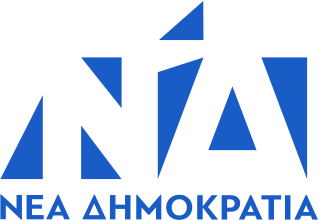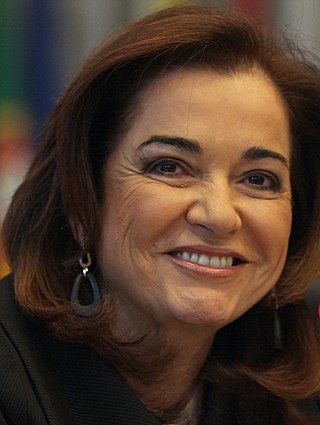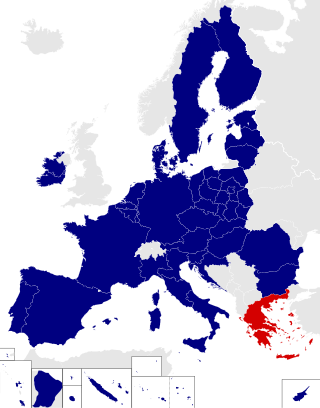
The Progressive Party of Working People is a Marxist–Leninist communist party in Cyprus.

The Panhellenic Socialist Movement, known mostly by its acronym PASOK, is a social-democratic political party in Greece. Until 2012 it was one of the two major parties in the country, along with New Democracy, its main political rival. In the June 2023 Greek legislative election it once again held firm on to its position of one of the ”big three” political parties of Greece.

New Democracy is a liberal-conservative political party in Greece. In contemporary Greek politics, New Democracy has been the main centre-right to right-wing political party and one of the two major parties along with its historic rival, the Panhellenic Socialist Movement (PASOK). New Democracy and PASOK were created in the wake of the toppling of the military junta in 1974, ruling Greece in succession for the next four decades. Following the electoral decline of PASOK, New Democracy remained one of the two major parties in Greece, the other being the Coalition of the Radical Left (SYRIZA). The party was founded in 1974 by Konstantinos Karamanlis and in the same year it formed the first cabinet of the Third Hellenic Republic. New Democracy is a member of the European People's Party, the largest European political party since 1999, the Centrist Democrat International, and the International Democracy Union.

Theodora "Dora" Bakoyanni is a Greek politician. From 2006 to 2009 she was Minister of Foreign Affairs of Greece, the highest position ever to have been held by a woman in the Cabinet of Greece at the time; she was also Chairperson-in-Office of the Organization for Security and Co-operation in Europe in 2009. Previously she was the Mayor of Athens from 2003 to 2006, the first female mayor in the city's history, and the first woman to serve as mayor of a city hosting the Olympic Games. She also served as Minister for Culture of Greece from 1992 to 1993.

Elections to the European Parliament take place every five years by universal adult suffrage; with more than 400 million people eligible to vote, they are the second largest democratic elections in the world after India's.
At a national level, Greece holds elections for its legislature, the Hellenic Parliament.
Eileen Lemass is an Irish former Fianna Fáil politician, who served as a Teachta Dála (TD) from 1977 to 1987, and also as a member of the European Parliament from 1984 to 1989.

Evangelos-Vasileios "Vangelis" Meimarakis is a Greek politician who served as the acting President of New Democracy and Leader of the Opposition in Greece from 5 July to 24 November 2015, competing as the challenger to Prime Minister Alexis Tsipras in the September 2015 Greek legislative election. He lost in the run-off of the New Democracy leadership election, 2015–16. Since 2019, he has been a Member of the European Parliament.

The Fighting Socialist Party of Greece, (ASKE), is a left-wing Greek political party founded in February 1984.

The 1984 European Parliament election was the first since the inaugural election of 1979 and the 1981 enlargement of the European Community to include Greece. It was also the last before the accession of Spain and Portugal in 1986.

Between 1973 and 1993 the European Communities saw the first enlargement of the Communities. On 1 January 1973, Denmark, Ireland, and the United Kingdom became the first countries to join the Communities. The détente allowed initiation of the reunification of the continent through establishing the Conference on Security and Co-operation in Europe. Greece was the next to join EC on 1 January 1981, followed by Spain and Portugal joining on 1 January 1986, while Turkey has initiated the procedure in 1987. Upon the fall of the Iron Curtain, the CSCE was transformed in 1990 into Organization for Security and Co-operation in Europe, the Communities enlarged for a fourth time through the German reunification, while other former communist European countries stated their firm commitment to join, prompting formulation of the Copenhagen criteria. This period was, however, also the one which witnessed the first voluntary exit from the Communities, namely the one of Greenland in 1985. The integration progressed under the Delors Commission resulting in the creation of the European Union in 1993.

Greece is a European Parliament constituency for elections in the European Union covering the member state of Greece. It is currently represented by twenty-one Members of the European Parliament.

European Parliament elections were held in Greece for the first time on 18 October 1981. The rest of the European Community voted in 1979 before Greece became a member state. Greece was allocated 24 seats in the Parliament.
The Group of the European Right was a far-right political group that operated in the European Parliament between 1984 and 1989. It was led by the neo-fascist National Front of Jean-Marie Le Pen. Its members also were the Italian Social Movement and Greek National Political Union. The Ulster Unionist Party was also a member of ER after 1985. ER was succeeded by the Technical Group of the European Right after the 1989 European Parliament election.

Evripidis Stylianidis is a Greek politician who has served as Minister for the Interior, Minister for Education and Minister for Transport and Communications. He is a member of New Democracy.

Progressive Party is a former Greek conservative political party founded in 1954 by Spyros Markezinis. The party was formed after Spyros Markezinis broke away from the Greek Rally.













